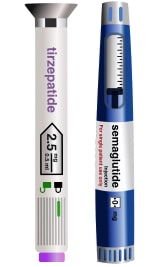What Is Gastric Sleeve Surgery?
Laparoscopic gastric sleeve surgery, also known as laparoscopic sleeve gastrectomy (LSG), is a bariatric procedure designed to remove a large portion of the stomach and limit food intake. Patients who are suffering from morbid obesity and are candidates for procedures such as the LAP-BAND® system may be eligible for gastric sleeve surgery. The procedure allows patients to have an earlier feeling of fullness after eating, leading to significant weight loss. Gastric sleeve surgery is not a reversible procedure like adjustable gastric banding options. The procedure was first performed on patients who weigh 500 pounds or more as a stage prior to gastric bypass or duodenal switch procedures. Its success in weight loss has led to its emergence as a primary operation on its own.
Please contact Suburban Surgical Care Specialists/Kane Center to schedule a consultation for laparoscopic gastric sleeve surgery from our Chicago bariatric surgeons.
Dr Kane saved my life. Because of him I am now down to 380 pounds. Thank you Dr Kane for all the great things you do. – Christopher S.
Am I a Candidate for Gastric Sleeve Surgery?
Gastric sleeve surgery can help patients lose large amounts of weight by surgically removing a significant portion of the stomach. It is often helpful for patients who are at an extreme risk of developing life-threatening illnesses that can be brought on by morbid obesity, and for those who qualify for other weight loss surgery procedures. In general, ideal candidates for gastric sleeve surgery are those with a BMI of 40 or over, or those with a BMI of at least 35 with comorbidities, like type 2 diabetes or high blood pressure. While gastric sleeve surgery has helped many patients lose weight safely and effectively, it is important to remember that this procedure is not reversible and, as with any major surgery, there are risks involved.
Our doctors here at Suburban Surgical Care Specialists/Kane Center will meet with you and discuss your candidacy for the procedure, as well as risks and benefits, in an initial consultation. All of your questions and concerns will be addressed, and together, we will decide if gastric sleeve surgery is the right procedure for your needs.
What Does the Laparoscopic Gastric Sleeve Procedure Involve?
Since gastric sleeve surgery is performed laparoscopically, with tiny instruments and small incisions, the procedure is typically completed more quickly and results in a more rapid recovery when compared with more traditional surgical techniques. Your bariatric surgeon will make five or six incisions in the abdominal region, through which he will permanently remove about 70-80 percent of the stomach using a stapling device.
Upon resectioning the stomach, your surgeon will create a thin stomach tube to retain the natural openings for food to pass through. This is what’s called the “sleeve,” and it will hold less food than before – helping you to feel full after less food intake and making it possible to lose significant amounts of weight.
The laparoscopic gastric sleeve procedure is performed under general anesthesia.

What Does the Recovery Entail After Gastric Sleeve Surgery?
Some pain and discomfort can be expected after gastric sleeve surgery; however, this is typically rather mild – owing to the use of the laparoscopic surgical technique – and can be managed with medication. Most patients can resume normal daily activities after one week. A special diet will need to be followed for the first several weeks to ensure your comfort and safety as your body recovers. Our bariatric surgery team will also schedule routine follow-up appointments with you to monitor your progress, ensure that you are healing properly, and help you adjust to your new dietary habits.
At Suburban Surgical Care Specialists/Kane Center, we want to make sure that you are losing weight safely and effectively. We have established a comprehensive aftercare program that is designed to assist you as you take further steps on the road to better health. Please feel free to attend one of our bariatric surgery seminars, or ask about our support groups. Fighting morbid obesity is a challenging, life-altering task, and our team is here to help you every step of the way.
What Complications Can Occur from Gastric Sleeve Surgery?
As with any surgery, the gastric sleeve procedure comes with certain risks. Although the procedure is considered safe when performed by a qualified surgeon, complications can occur after surgery, such as pain, infection, and bleeding. Gastroesophageal reflux disease (GERD) can develop in some patients. Our team will advise you on how to identify and respond to any complications, should they occur.
Since the gastric sleeve significantly reduces the size of the stomach, you will not be able to eat large amounts of food. This can make it difficult to get enough nutrients, making it necessary to take certain vitamins and supplements long-term. Your surgeon will recommend the supplements you will need to take, helping you lose weight in a healthy manner and avoid malnutrition. To avoid the risk of regaining weight after undergoing gastric sleeve surgery, it is essential that you adopt healthy habits and regularly exercise to maintain your results for years to come.
What Should I Eat After Gastric Sleeve Surgery?
Your diet after gastric sleeve surgery is an essential part of both your recovery and transition to a healthier lifestyle. The first month after surgery typically entails consuming a special diet that heavily relies on liquids and protein, while avoiding sugary or fatty items. See below for a general look at what you can expect:
-
Week 1
Clear liquid diet, such as Jell-O, broth, popsicles, and tea. It is important to avoid items like carbonated or sugary drinks, as well as caffeine.
-
Week 2
Liquid diet with protein, like protein drinks, yogurt, pudding, and thin soups.
-
Week 3
Soft or pureed foods, like hummus, soft vegetables, scrambled eggs, and steamed fish. Avoid starchy or fibrous vegetables.
-
Week 4
Slowly introduce more foods into your system, like mashed potatoes, cereal, fruits, and chicken.
After this first month, you can continue to incorporate new foods into your diet. To limit stomach aches, constipation, and diarrhea, you should make sure to chew your food well, introduce foods very slowly, avoid snacking, eat nutrient-dense foods, and avoid sugary items and carbonated beverages. Vitamins and other supplements will be needed long-term to prevent deficiencies and promote good overall health.
Our team will provide you with a detailed list of what you should and should not consume after gastric sleeve surgery to help you navigate your recovery. You may not have an appetite at first, but this should gradually return throughout the first few weeks after surgery.
How Long Will My Gastric Sleeve Results Last?
The majority of weight loss following gastric sleeve surgery typically occurs within the two years, and the results from the procedure are considered long-lasting. While most patients tend to have stable weight loss results after their gastric sleeve, it is possible to regain weight if the proper dietary changes and an exercise regimen are not sustained. This is why it is important to attend follow-up appointments with your surgeon so they can monitor your progress. Studies have shown that patients who maintain a healthy lifestyle after gastric sleeve surgery can not only lose a significant amount of weight, but keep it off. This can lead to lasting improvement — and in some cases resolution — of comorbidities.
How Much Does Gastric Sleeve Surgery Cost?
The average cost of gastric sleeve surgery in the greater Chicago, Illinois area is about $17,000. However, this can vary widely depending on multiple factors. The geographic location of the practice and expertise of the surgeon both influence the total amount you can expect to pay for your procedure. In addition, there may be related fees that contribute to your cost, such as those from pre-operative tests, anesthesia, the hospital facility, and possible medications.
Our team will provide you with a personalized quote before your gastric sleeve surgery to help you understand how much your procedure will cost. We also accept financing through a third-party lender to help make your gastric sleeve surgery a reality. When considering weight loss surgery, remember that it is an investment into your lifelong health.
Did you know that weight loss surgery is often a covered benefit? Contact our bariatric surgical practice to schedule a consultation, or to discuss other weight loss surgery options such as the gastric bypass procedure.
Additional Gastric Sleeve Frequently Asked Questions
Can Gastric Sleeve Surgery Cause or Worsen Acid Reflux?
Many patients find that losing weight after gastric sleeve surgery can actually help relieve symptoms of acid reflux. However, in some cases, individuals may notice new or increased reflux following the procedure. This is typically due to changes in stomach pressure, and it does not happen to everyone. If you have a history of GERD, your surgeon will work closely with you to determine the best surgical approach for your needs — sometimes recommending an alternative procedure like gastric bypass. Should reflux occur after surgery, it is often mild and can usually be well-managed with medication, dietary adjustments, and guidance from your care team.
Can I Have a Gastric Sleeve Revision?
Yes. Revision surgery may be recommended if you experience insufficient weight loss, weight regain, or complications such as chronic acid reflux. A common approach involves converting the gastric sleeve to a gastric bypass to improve results or alleviate symptoms. If you are struggling after your initial procedure, our bariatric surgeons can assess your situation and help determine if a revision is appropriate.
How Much Weight Can I Lose After Gastric Sleeve Surgery?
On average, patients lose about 60 to 70 percent of their excess body weight within 12 to 18 months of surgery. Results vary based on individual commitment to dietary guidelines, physical activity, and long-term lifestyle changes. Gastric sleeve surgery is a powerful weight loss tool, and with ongoing support and follow-up care, many patients achieve long-lasting success.
Is It Safe to Get Pregnant After Gastric Sleeve Surgery?
Yes — but it is generally recommended to wait 12 to 18 months after surgery before becoming pregnant. This allows your body to adjust to the rapid weight loss and helps ensure proper nutrition during pregnancy. Many women see improved fertility after weight loss.

